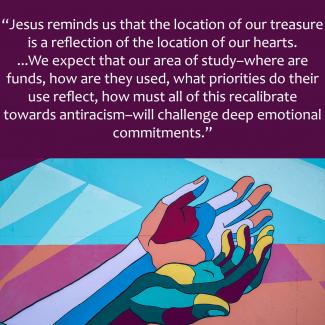A reflection from the Racial Justice Commission's Subcommittee on Resource Allocation, spotlighting its priorities and progress
The primary goal of the Subcommittee on Resource Allocation is to ensure that financial resources of and within the diocese are all drawn and deployed in ways that promote antiracism and inclusion. Some questions that guide our work are: How are these resources allocated in and within the diocese? How is compensation set, and are BIPOC individuals justly compensated for their work at the diocesan and/or congregational level? And, most importantly, is there a way to ensure that all financial resources and processes are held under scrutiny that reflects the diocesan commitment to racial justice and equity? To accomplish this important goal we have set as our priorities to:
- Review historical diocesan financial audits and complete a current audit with a focus on the rationale for the allocation and distribution of resources;
- Review and assess how the budgeting process and rationale related to diversity, equity, inclusion and racial justice; and,
- Survey select congregations of varying financial resource levels, races and ethnicities, size and geographical location for a similar review of budget processes and rationale.
The first task of our subcommittee was to identify a truly representative group of individuals to join us as members. We sought Black and Brown members or those from congregations in underrepresented Black and Brown communities. We also sought a gender balance as well as clergy and lay representation. While our search for members took more time than expected, we are proud of the diverse and inclusive subcommittee we have finally assembled.
Over the next several months, as part of our audit process, we will conduct interviews with key diocesan staff (clergy and lay) with finance and budget responsibilities, continue our review of past and current financial audits, and begin the selection and survey of congregations with a focus on urban/suburban, BIPOC/white European, local geographic and wealthy/underresourced community characteristics.
Jesus reminds us that the location of our treasure is a reflection of the location of our hearts (Matthew 6:21), warning us that words, actions and even proclaimed beliefs can reflect one set of commitments, yet the location of our treasure expresses evidence of conversion.
We expect that our area of study--where are funds, how are they used, what priorities do their use reflect and how must all of this recalibrate towards antiracism--will challenge deep emotional commitments that, for a primarily white and long-established church, feel "untouchable" and "off limits" and that may be. That is for the church today to determine.
This work is gradual and deliberate, and this needs to be balanced with the urgency of moving towards just resolution to the inequities that financial resource allocation--among eastern Massachusetts congregations and within the diocese--imposes on the children of God. It is frustrating to move slowly; it is also easy to pass over hard questions.
Racial Justice Commission Subcommittee on Resource Allocation
Co-Chairs: Holly Maze Carter (Parish of St. John the Evangelist, Hingham): hmazecarter@gmail.com
The Rev. Hall Kirkham (St. Michael's Church, Milton): hkirkham@stmichaelsmilton.org
Members: The Rev. Morgan Allen (Trinity Church, Boston), Olisa Adigwe (St. Anne's Church, Lowell), Tamara Sobers (Church of the Holy Spirit, Mattapan), The Rev. Paul Minor (All Saints' Church, Belmont), Patricia Henderson (Christ Church, Hyde Park)
Mandate: Ensure financial resources are allocated in ways that promote antiracism, on the diocesan and congregational levels. This includes, but is not limited to, how resources are allocated in the diocese; how compensation is set; and for justly compensating BIPOC individuals for often unpaid volunteer labor.
Photo by Tim Mossholder on Unsplash

